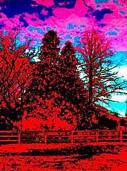
Cedar Gallery
Home
|
Cedar info |
News |
Contact |
![]() Dutch
Dutch


kiss
Poems on nostalgia and desire by Akhmatova, Bukowski, Dickinson, Moraes,Thomas a.o.
And As It's Going (1907)
And as it's going often at love's
breaking,
The ghost of first days came again to us,
The silver willow through window then
stretched in,
The silver beauty of her gentle branches.
The bird began to sing the song of light
and pleasure
To us, who fears to lift looks from the
earth,
Who are so lofty, bitter and intense,
About days when we were saved together.
Anna Akhmatova
Transl.: Yevgeny Bonver , ed.
by Dmitry Karshtedt, 2001
Quiet Night Thoughts
Before the bed I lie on, the moon is shining
The moonlight cast upon the floor like frost
While I raise my head to gaze at the moon
I lower it to think of village home
Li Bai
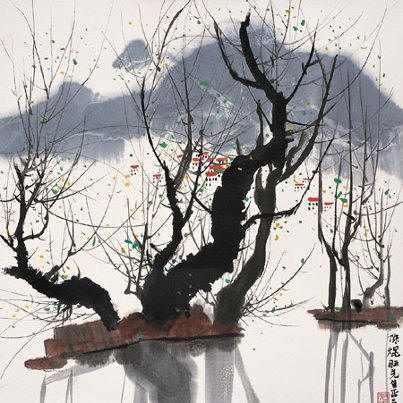
Wu Guanzhong
Beer
I don't know how many bottles of beer
I have consumed while waiting for things
to get better
I dont know how much wine and whisky
and beer
mostly beer
I have consumed after
splits with women-
waiting for the phone to ring
waiting for the sound of footsteps,
and the phone to ring
waiting for the sounds of footsteps,
and the phone never rings
until much later
and the footsteps never arrive
until much later
when my stomach is coming up
out of my mouth
they arrive as fresh as spring flowers:
"what the hell have you done to yourself?
it will be 3 days before you can fuck me!"
the female is durable
she lives seven and one half years longer
than the male, and she drinks very little beer
because she knows its bad for the figure.
while we are going mad
they are out
dancing and laughing
with horney cowboys.
well, there's beer
sacks and sacks of empty beer bottles
and when you pick one up
the bottle fall through the wet bottom
of the paper sack
rolling
clanking
spilling gray wet ash
and stale beer,
or the sacks fall over at 4 a.m.
in the morning
making the only sound in your life.
beer
rivers and seas of beer
the radio singing love songs
as the phone remains silent
and the walls stand
straight up and down
and beer is all there is.
Charles Bukowski
from: Love is A Mad Dog From Hell
Without you
Well I cant forget this evening
Or your face as you were leaving
But I guess thats just the way
The story goes
You always smile but in your eyes
Your sorrow shows
Yes it shows
I cant live
If living is without you
I cant live
I cant give any more
I cant live
If living is without you
I cant give
I cant give anymore
Mariah Carey
YouTube: http://www.youtube.com/watch?v=vOR_jq9M53c
Exile
for Kwame Dawes
Your scuttled pays
floats -- fiery -- in the ether;
Blazing, it
vomits smudge-smoke. Your mind chars
Black because you yaw –- moth-like -– too near flames.
You douse your dream-scorched brain with slave-sweat rum --
The only gold you can own, corroding
Your liver. Your anthem plays
to gunfire.
When you think
about it (when you can breathe) –-
After all the lies that frame nostalgia,
All the dead faces that occupy photographs,
All the slain lovers pitched into ditches,
Your eyes itch and ache with water, then dry –-
Curling like dead leaves, starving for gold fire.
George Elliott Clarke (1960-)
There is another sky
There is another sky,
Ever serene and fair,
And there is another sunshine,
Though it be darkness there;
Never mind faded forests, Austin,
Never mind silent fields -
Here is a little forest,
Whose leaf is ever green;
Here is a brighter garden,
Where not a frost has been;
In its unfading flowers
I hear the bright bee hum:
Prithee, my brother,
Into my garden come!
Emily Dickinson
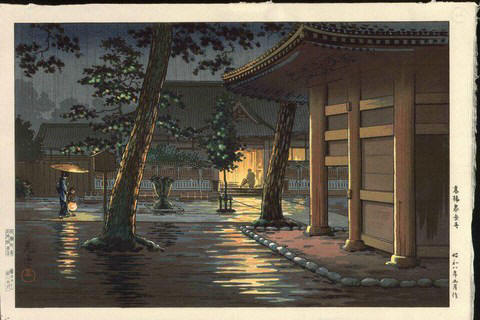
Tsuchiya Koitsu (1870-1949)
Black Map
in the end, cold crows piece together
the night: a black map
I’ve come home-- the way back
longer than the wrong road
long as a life
bring the heart of winter
when spring water and horse pills
become the words of night
when memory barks
a rainbow haunts the black market
my father's life-spark small as a pea
I am his echo
turning the corner of encounters
a former lover hides in a wind
swirling with letters
Beijing, let me
toast your lamplights
let my white hair lead
the way through the black map
as though a storm were taking you to fly
I wait in line until the small window
shuts: O the bright moon
I’ve come home-- goodbyes
are less than reunion
only one less
Bei Dao
Translated from Chinese by Eliot Weinberger
Meditation on a Bone
A piece of bone, found at Trondhjem in 1901, with the
following runic inscription (about AD 1050) cut on it:
I loved her as a maiden; I will not trouble Erlend’s
detestable wife; better she should be a widow.
Words scored upon a bone,
Scratched in despair or rage –
Nine hundred years have gone;
Now, in another age,
They burn with passion on
A scholar’s tranquil page.
The scholar takes his pen
And turns the bone about,
And writes those words again.
Once more they seethe and shout,
And through a human brain
Undying hate rings out.
‘I loved her when a maid;
I loathe and love the wife
That warms another’s bed:
Let him beware his life!’
The scholar’s hand is stayed;
His pen becomes a knife
To grave in living bone
The fierce archaic cry.
He sits and reads his own
Dull sum of misery.
A thousand years have flown
Before that ink is dry.
And, in a foreign tongue,
A man, who is not he,
Reads and his heart is wrung
This ancient grief to see,
And thinks: When I am dung,
What bone shall speak for me?
A.D. Hope
Identity
Some
lives ago, the rustle of dry leaves
in autumn weather, was a sound I liked.
No autumns here: I seldom hear it here.
But I
was living here, next time I looked.
Inhaled in ruined manors down the road,
my grandsires' excrement defiled my day.
The
engineer, the doctor, moneyed men,
obsequious to their gods until they died.
All that they were, the rain flushes away.
But it
still falls on me, not now a child.
From rain and offices, bodies come back.
At dusk the concrete antheap where I am
shudders awake and switches on its eyes.
To
those who pass under the sullen rain
the entire block seems dressed in fireflies
that slowly, after midnight, blink to black.
Others
will sleep, exhausted after work.
But electronic rats' eyes round my room,
as my grandsires clutch me in the dark,
burn
crimson, for the dark is what I am.
Somehow the brilliant boy lives in me still.
But my clothes have a smell that I, a boy,
was nauseated by, my grandsires' smell.
Out of
their soul, defeated flesh it rose.
How many years now have I left to bear
the stench of an old body in my clothes?
I have
only that one question left to ask.
Some consolation comes for all my lives,
For when dusk falls and I am at my desk,
sometimes the rain rustles like dry leaves.
Dom Moraes
The Spring and the Fall
In the spring of the year, in the spring of the year,
I walked the road beside my dear.
The trees were black where the bark was wet.
I see them yet, in the spring of the year.
He broke me a bough of the blossoming peach
That was out of the way and hard to reach.
In the fall of the year, in the fall of the year,
I walked the road beside my dear.
The rooks went up with a raucous trill.
I hear them still, in the fall of the year.
He laughed at all I dared to praise
And broke my heart, in little ways.
Year be spring or year be falling,
The bark will drip and the birds be calling.
There's much that's fine to see and hear
In the spring of a year, in the fall of a year.
'Tis not love's going hurt my days,
But that it went in little ways.
Edna St. Vincent Millay
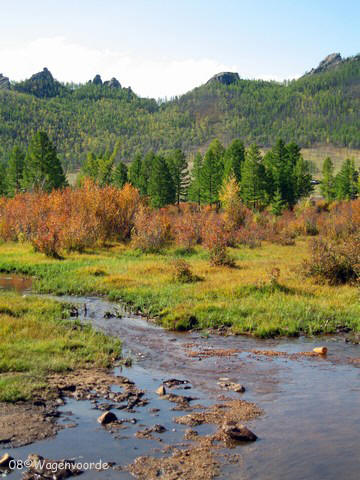
A
Ballad of Burdens
The burden of fair women. Vain delight,
And love self-slain in some sweet shameful way,
And sorrowful old age that comes by night
As a thief comes that has no heart by day,
And change that finds fair cheeks and leaves them grey,
And weariness that keeps awake for hire,
And grief that says what pleasure used to say;
This is the end of every man's desire.
The burden of bought kisses. This is sore,
A burden without fruit in childbearing;
Between the nightfall and the dawn threescore,
Threescore between the dawn and evening.
The shuddering in thy lips, the shuddering
In thy sad eyelids tremulous like fire,
Makes love seem shameful and a wretched thing.
This is the end of every man's desire.
The burden of sweet speeches. Nay, kneel down,
Cover thy head, and weep; for verily
These market-men that buy thy white and brown
In the last days shall take no thought for thee.
In the last days like earth thy face shall be,
Yea, like sea-marsh made thick with brine and mire,
Sad with sick leavings of the sterile sea.
This is the end of every man's desire.
The burden of long living. Thou shalt fear
Waking, and sleeping mourn upon thy bed;
And say at night "Would God the day were here,"
And say at dawn "Would God the day were dead."
With weary days thou shalt be clothed and fed,
And wear remorse of heart for thine attire,
Pain for thy girdle and sorrow upon thine head;
This is the end of every man's desire.
The burden of bright colours. Thou shalt see
Gold tarnished, and the grey above the green;
And as the thing thou seest thy face shall be,
And no more as the thing beforetime seen.
And thou shalt say of mercy "It hath been,"
And living, watch the old lips and loves expire,
And talking, tears shall take thy breath between;
This is the end of every man's desire.
The burden of sad sayings. In that day
Thou shalt tell all thy days and hours, and tell
Thy times and ways and words of love, and say
How one was dear and one desirable,
And sweet was life to hear and sweet to smell,
But now with lights reverse the old hours retire
And the last hour is shod with fire from hell;
This is the end of every man's desire.
The burden of four seasons. Rain in spring,
White rain and wind among the tender trees;
A summer of green sorrows gathering,
Rank autumn in a mist of miseries,
With sad face set towards the year, that sees
The charred ash drop out of the dropping pyre,
And winter wan with many maladies;
This is the end of every man's desire.
The burden of dead faces. Out of sight
And out of love, beyond the reach of hands,
Changed in the changing of the dark and light,
They walk and weep about the barren lands
Where no seed is nor any garner stands,
Where in short breaths the doubtful days respire,
And time's turned glass lets through the sighing sands;
This is the end of every man's desire.
The burden of much gladness. Life and lust
Forsake thee, and the face of thy delight;
And underfoot the heavy hour strews dust,
And overhead strange weathers burn and bite;
And where the red was, lo the bloodless white,
And where the truth was, the likeness of a liar,
And where the day was, the likeness of the night;
This is the end of every man's desire.
L 'Envoy
Princes, and ye whom pleasure quickeneth,
Heed well this rhyme before your pleasure tire;
For life is sweet, but after life is death.
This is the end of every man's desire.
Algernon Charles Swinburne (1837-1909)
Fern Hill
Now as I was young and easy under the apple boughs
About the lilting house and happy as the grass was green,
The night above the dingle starry,
Time let me hail and climb
Golden in the heydays of his eyes,
And honoured among wagons I was prince of the apple towns
And once below a time I lordly had the trees and leaves
Trail with daisies and barley
Down the rivers of the windfall light.
And as I was green and carefree, famous among the barns
About the happy yard and singing as the farm was home,
In the sun that is young once only,
Time let me play and be
Golden in the mercy of his means,
And green and golden I was huntsman and herdsman, the calves
Sang to my horn, the foxes on the hills barked clear and cold,
And the sabbath rang slowly
In the pebbles of the holy streams.
All the sun long it was running, it was lovely, the hay
Fields high as the house, the tunes from the chimneys, it was air
And playing, lovely and watery
And fire green as grass.
And nightly under the simple stars
As I rode to sleep the owls were bearing the farm away,
All the moon long I heard, blessed among stables, the nightjars
Flying with the ricks, and the horses
Flashing into the dark.
And then to awake, and the farm, like a wanderer white
With the dew, come back, the cock on his shoulder: it was all
Shining, it was Adam and maiden,
The sky gathered again
And the sun grew round that very day.
So it must have been after the birth of the simple light
In the first, spinning place, the spellbound horses walking warm
Out of the whinnying green stable
On to the fields of praise.
And honoured among foxes and pheasants by the gay house
Under the new made clouds and happy as the heart was long,
In the sun born over and over,
I ran my heedless ways,
My wishes raced through the house high hay
And nothing I cared, at my sky blue trades, that time allows
In all his tuneful turning so few and such morning songs
Before the children green and golden
Follow him out of grace.
Nothing I cared, in the lamb white days, that time would take me
Up to the swallow thronged loft by the shadow of my hand,
In the moon that is always rising,
Nor that riding to sleep
I should hear him fly with the high fields
And wake to the farm forever fled from the childless land.
Oh as I was young and easy in the mercy of his means,
Time held me green and dying
Though I sang in my chains like the sea.
Dylan Thomas
Returning Home
I left this village in my youth, returning, now I'm old
The village accent hasn't changed, my fringe grown grey
The youngsters see me but they don't know me
Half laughing, they who am I and where I come from
He Zhizhang
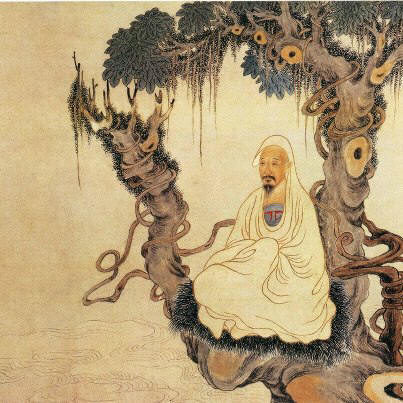
Gai Qi, Chinese poet and painter (1774-1829)
One of our primary goals at Cedar Gallery is to provide a public forum for both unknown and established poets to showcase their works. We particularly encourage contributions from unpublished aspiring artists, but are happy to consider all submissions.
Please, send your contributions to: cedars@live.nl
Texts, pictures,
etc. are the property of their respective owners.
Cedar Gallery is a non-profit site. All works and articles are published
on this site purely for educational reasons, for the purpose of
information and with good intentions. If the legal representatives ask
us to remove a text or picture from the site, this will be done
immediately. We guarantee to fulfill such demands within 72 hours.
(Cedar Gallery reserves the right to investigate whether the person
submitting that demand is authorized to do so or not).
The contents of this website (texts, pictures and other material) are protected by copyright. You are welcome to visit the site and enjoy it, but you are not allowed to use it, copy it, spread it. If you like to use a picture or text, first send your request to